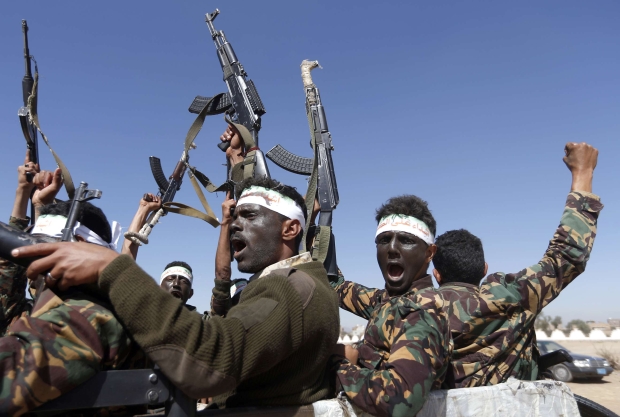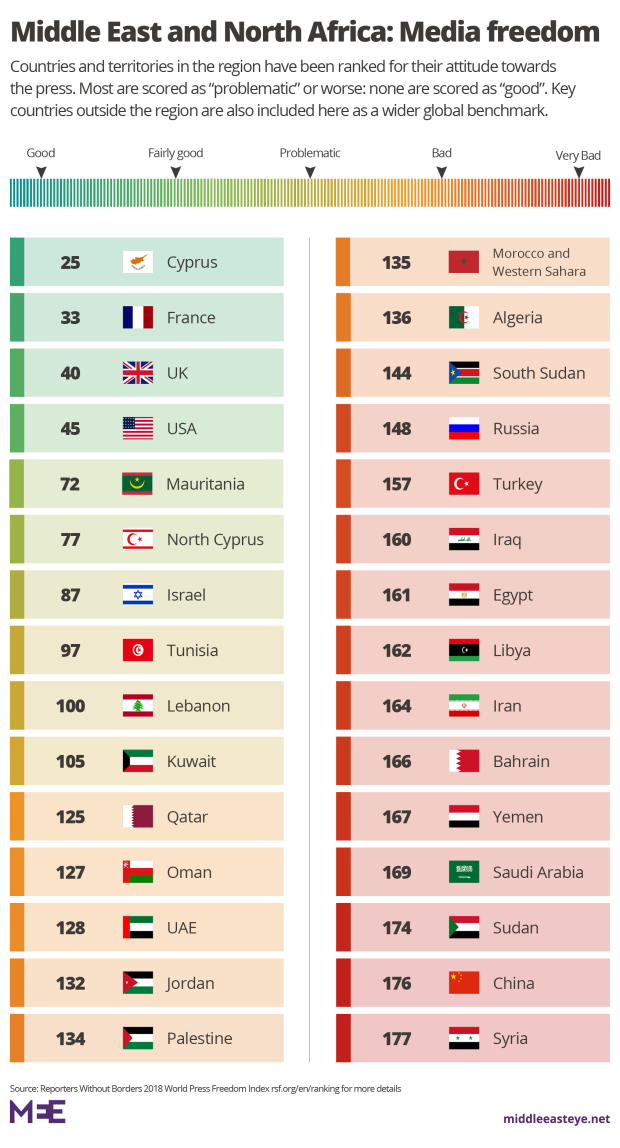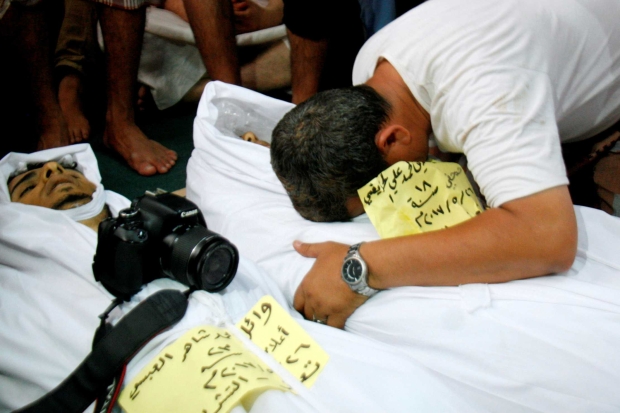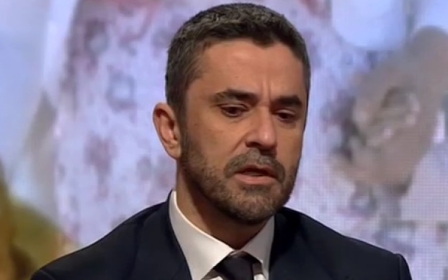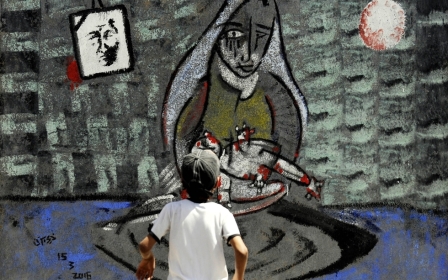The most dangerous job in Yemen’s war zone? Being a homegrown reporter
TAIZ, Yemen - Hamdan al-Alie used to report on life in Yemen for local and international newspapers. But when the Houthis started their advance in August 2014 he, like many fellow journalists, became a target for fighters and militia.
"When the Houthis were still fighting in Saada, supporters of the Houthis in Sanaa threatened to kill me,” he says.
'When the Houthis were still fighting in Saada, supporters of the Houthis in Sanaa threatened to kill me'
- Hamdan al-Alie, journalist
Alie continued to work, even when the Houthis, the Iran-aligned movement at war with the Saudi coalition, took control of Sanaa on 21 September 2014. His stories included investigations into alleged corruption and atrocities by Houthi forces, the recruitment of child soldiers and the victims of landmines.
Then, in March 2015, the Saudi-led coalition launched its anti-Houthi offensive, and life for Alie, 36, became even tougher as Houthis accused reporters of helping enemy forces.
Alie returned home to the province of al-Mahwit with his wife and children, hoping that the presence of his extended family and tribe would protect them.
But things didn't work out.
No escape from harassment
Since 2015, hundreds of journalists have been driven from their homes in war-torn Yemen, and usually they flee Houthi forces in Sanaa towards pro-government areas, or go abroad.
Unlike overseas correspondents reporting on the war, Yemeni reporters such as Alie have family and friends who may also be at risk of reprisals, increasing the risks involved.
Back in al-Mahwit, Alie hoped for a less dangerous working life. He continued reporting for seven months, but the threats now came from Houthis in his neighbourhood.
Often they would publicly accuse him of feeding information to the Saudi-led air forces on how best to target civilians, allegations he denies and which he feared would incite politically neutral residents to target him in the street.
On another occasion, a Houthi leader publicly threatened to take Alie to a prison in Sadaa, which is reserved for its high-profile prisoners, rather than al-Mahwit or Sanaa, where detainees are at least accorded a trial.
Often they would publicly accuse Alie of feeding information to the Saudi-led air forces on how best to target civilians, allegations he denies
"The Houthis sent their fighters to take me from my house more than once,” he says. “But I used to know they were coming, so I was able to leave and hide somewhere anonymous and safe.”
In late 2015, Alie secretly left al-Mahwit with his wife and three daughters, amid fears that Alie's presence would lead to fighting between his tribe and the Houthis.
The arduous journey took them first to Marib, then Saudi Arabia and finally the relative safety of Egypt, where Alie has friends.
"My journey towards Saudi was a top secret and I did not tell even my relatives about it," Alie says, "because if the Houthis knew about it, then they will arrest me on the way.
“It was horrible and dangerous. I was thinking that the Houthis would arrest me at a checkpoint.”
Egypt, Alie's new country of residence is ranked 161st for journalistic freedom, only a handful of places higher than Yemen. But the authorities there shown no interest in Alie, as he only reports on his former home.
Fate sealed by his press cards
Alie is aware of how lucky he was. He knows of journalists detained by the Houthis who have been tortured in prison or used as human shields or killed by sniper fire.
In February 2016, for example, journalist Ahmed Al-Shaibani was shot and killed in Taiz. Condemning his death, Irina Bokova, the then director-general of UNESCO, said such acts were a war crime under international law. “It also deprives civilians of vital information they need to cope with the difficulties of war," she said, "and undermines informed public debate, which is so important to help restore peace and stability.”
Alie says: "What happened with me is a very minor in comparison with what happened with my colleagues.
"Houthi militias treat journalists as more dangerous than politicians or fighters. There is direct incitement against the journalists by Abdul Malik al-Houthi [the leader of the Houthis] himself." Sometimes that attention has fatal consequences. On 2 June, Yemeni journalist Anwar al-Rakan died just days after being released by the Houthis in Taiz. He had faced a year of mistreatment, said RSF.
His family said he had been arrested while travelling through al-Houban on his way from Sanaa. Reports indicate that possession of press cards sealed his fate.
In a statement, RSF said that Rakan was in a terminally ill condition when he was finally freed and that his family, unaware of his detention, had been unable to campaign for his release.
It added: “The Houthis continue to hold at least 10 journalists and one citizen journalist captive. But they could be holding many more because they provide no information about any of their activities including, as in Rakan’s case, who they have detained and where they are holding them.” The group urged all sides in Yemen to stop targeting the media and to free all imprisoned journalists.
The Yemeni Journalists Syndicate (YJS) quoted Rakan’s family as saying that, on his release, he was ravaged by starvation, torture and disease. Photos of his emaciated body have circulated on social media networks.
Sophie Anmuth, the head of RSF’s Middle East desk, said: "The Houthis allowed Anwar al-Rakan to become fatally ill in detention without providing him with the medical attention he needed and without alerting his family in time. The journalists they are holding, some since 2015, must be freed at once.
"All the parties to the war in Yemen, whether the Houthis, al-Qaeda or the Arab coalition, must stop intimidating, torturing or abducting the journalists they dislike."
But Mohammed al-Dailami, a pro-Houthi political analyst and journalist, denied accusations that Houthis torture prisoners to death and says they only chase down journalists who "distort facts for the sake of the aggression [the Saudi-led coalition]. Such work does not serve Yemenis and they work against Yemen.
"The arrested journalists in Sanaa are subjected to a fair trial and the Houthis have not killed anyone. Rather, they treat them respectfully and let their relatives visit them."
He stated that there are hundreds of independent journalists who work in Houthi-controlled areas and who the Houthis do not pursue.
'We are targets'
The Houthis are held responsible for some of the worst atrocities against journalists during the Yemen war, but they are not the only side to target reporters.
According to the YSJ, 27 journalists have been killed since the Yemen civil war began in late 2014. Twelve are being held captive by the Houthi group, while one other is being held hostage by al-Qaeda in the Arabian Peninsula. In March 2018, the Houthi group released two journalists after almost two years of detention.
It also reported on 4 July that 100 cases of media freedom violations were recorded in the first half of 2018, including kidnapping, arrest, torture, blocking of news sites and suspension of salaries.
Fathi Bin Lazraq, editor-in-chief of Aden al-Ghad newspaper, was stopped by two military vehicles while driving in Aden on 2 July, then blindfolded and taken to a prison run by pro-UAE supporters.
His captors said he was taken because he had been critical of the military leadership in Aden in stories about corruption and land seizure. On Facebook, he wrote that after 24 hours a pro-Hadi leader arrived, freed him and apologised for his ordeal.
Those detained by pro-government forces tend to be detained for less time than those held by the Houthis - they also usually stay in pro-government regions after their ordeal rather than flee.
'Both the pro-government and the Houthis consider independent journalists to be enemies and both are chasing them'
- Freelance journalist
A freelance independent journalist told MEE on condition of anonymity because he fears detention: "Both the pro-government and the Houthis consider independent journalists to be enemies and both are chasing them."
He said that he cannot use his byline in his stories because he will be a target for the two warring sides: "I expose the violations of the two sides independently and this is dangerous nowadays as the independent journalists are targets of warring sides."
Alie says that he cannot return to Sanaa until the liberation of the country from the Houthis. "We are targets of the Houthi militia and I will not put myself and family in danger.
“I hope that the pro-government forces liberate the country from the Houthi militias, so we can practise our job from anywhere inside Yemen."
Middle East Eye propose une couverture et une analyse indépendantes et incomparables du Moyen-Orient, de l’Afrique du Nord et d’autres régions du monde. Pour en savoir plus sur la reprise de ce contenu et les frais qui s’appliquent, veuillez remplir ce formulaire [en anglais]. Pour en savoir plus sur MEE, cliquez ici [en anglais].


